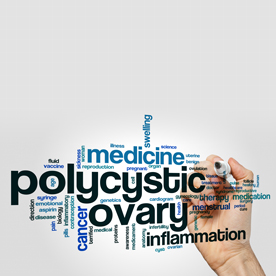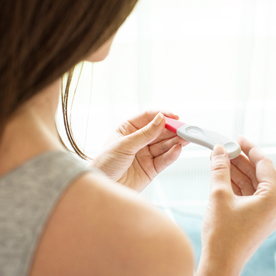
PCOS is a complex, often misunderstood, hormonal condition that affects 1 in 10 women in the UK (1). Although the exact cause remains largely unclear, research suggests high levels of androgens – sometimes referred to as ‘male’ hormones – and insulin resistance play an important role (2). And it’s these changes that can lead to a range of challenging physical and emotional effects.
It’s worth noting, however, that PCOS symptoms exist on a spectrum. Each woman’s experience is unique and no one diagnosis will look the same. Understanding these nuances is the key to getting the appropriate treatment and support.
What are the symptoms of PCOS?
PCOS affects the functioning of a woman’s ovaries. There are three main features of this endocrine disorder (3). If you experience two or more of these symptoms, you’ll likely receive an official diagnosis.
-
Irregular or skipped periods, which means the ovaries don’t release eggs regularly (ovulation)
-
High levels of androgens (‘male’ hormones), which can lead to physical symptoms like excess facial or body hair and acne
-
Polycystic ovaries, in which the ovaries become enlarged and contain fluid-filled sacs (follicles) that surround the eggs
Other symptoms of PCOS may include (4):
-
Excess facial or body hair, otherwise known as hirsutism
Skin PCOS symptoms
Excessive androgen levels, specifically testosterone, can lead to skin changes in women with PCOS. These hormonal imbalances stimulate the sebaceous gland to produce more oil than necessary, which clogs pores and creates the perfect environment for acne (5).
 You may experience breakouts on the lower half of the face, including the jawline, chin, and upper neck, often referred to as a hormonal pattern for acne. Sometimes, these lesions can be larger, deeper, and harder to heal.
You may experience breakouts on the lower half of the face, including the jawline, chin, and upper neck, often referred to as a hormonal pattern for acne. Sometimes, these lesions can be larger, deeper, and harder to heal.
Aside from acne, PCOS is also associated with skin tags in the armpits or neck area, as well as dark patches of skin on the arms, neck, breasts or thighs.
Changes in skin health can be one of the most perceptible symptoms of PCOS, prompting many women to seek advice, especially because it can affect self-esteem and mental health.
You can discover more about managing skin PCOS symptoms, like acne, here.
Hair PCOS symptoms
Higher than normal testosterone can also cause virilisation, the development of more masculine features. And this often leads to changes in hair growth.
With PCOS, you may experience excessive facial and body hair growth (hirsutism) on your upper lip, chin, chest, abdomen, and back. Equally, you may notice hair loss or thinning, particularly near the front of your scalp, often known as female pattern hair loss or androgenic alopecia.
Such visible PCOS symptoms can be extremely difficult to navigate for some people. They can lead to body image issues and increase the risk of anxiety and depression.
Read our guide on navigating PCOS hair loss here, and managing excessive hair growth (hirsutism) here.
PCOS period symptoms
The hormone imbalances that characterise PCOS can also lead to irregular or absent menstrual cycles. High levels of testosterone can prevent ovulation, which may make it harder to conceive (6). In some cases, PCOS may lead to painful and heavy periods, too.
If you have PCOS and experience irregular periods or painful periods, there are several treatments and management tools available to support you and your menstrual health. Our guide to irregular periods is a great place to start.
PCOS pregnancy symptoms
Though PCOS can make family planning more challenging, falling pregnant is still entirely possible – and worth celebrating.
However, navigating PCOS during pregnancy can make things are little more complex. It can bring an increased risk of premature birth, preeclampsia, gestational diabetes, and, regrettably, miscarriage.
These complications can be difficult, so it’s important to arm yourself will the tools and support you need. You can find out more about PCOS and pregnancy here.
PCOS symptoms pain
In some cases, PCOS may increase the risk of pelvic pain (7). However, it’s important to note discomfort could also be a sign of another condition, like endometriosis, fibroids, interstitial cystitis, STDs, or digestive problems. If you have any severe pelvic pain, always speak to your doctor.
Inflammatory PCOS symptoms
PCOS is often associated with chronic inflammation in the body. Research suggests many women with PCOS have higher inflammatory markers than those without the condition, which can lead to androgen production (8).
When you have PCOS, chronic, low-grade inflammation may play a role in fertility issues, type-2 diabetes, and heart disease.
What are PCOS cysts?
The term ‘polycystic ovaries’ in PCOS refer to a number of small ‘cysts’ – around twice as many as in normal ovaries and generally no bigger than 8 millimetres – that sit just below the surface of the ovaries.
These ‘PCOS cysts’ aren’t cysts in the traditional sense (9). They don’t burst. They don’t get bigger. And they don’t need to be surgically removed. PCOS cysts are simply the outcome of a woman not ovulating regularly; they’re immature ovarian follicles. That’s why the name of the condition can be misrepresentative.
Polycystic ovaries were once thought to cause the condition. But they’re now understood to be a symptom. Plus, not everyone will have them. So, despite its name, polycystic ovaries aren’t a defining feature of PCOS. You can also have polycystic ovaries (PCO) without the syndrome (PCOS).
What’s the difference between polycystic ovaries and ovarian cysts?
People often confuse polycystic ovaries and ovarian cysts. However, they’re two different things. A ‘cyst’ is a fluid-filled sac usually bigger than 2cm lined with epithelium (thin tissue on the surface of organs).
But in the context of PCOS, the polycystic ovaries are typically bigger and contain multiple small follicles, often less than 8mm, that aren’t lined with epithelium. The multiple ovarian follicles in polycystic ovaries can sometimes – not always – lead to follicular cysts, the most common type of ovarian cyst. But , follicular cysts can also occur in those without PCOS.
Symptoms of ovarian cysts include pelvic pain, bloating, nausea, abdominal pressure, and heavy or irregular periods, which can overlap with PCOS.
Unusual symptoms of PCOS
PCOS is much more than irregular periods and weight gain. It’s a unique experience. Sometimes, it can lead to ‘hidden’ symptoms, such as breathing problems, like sleep apnoea, extreme fatigue, darkened skin behind the neck, underarms, and groin, and psychological changes, including increased depression and anxiety.
Having a better understanding of the lesser-known symptoms can help with a diagnosis and an appropriate management plan.
What are the long-term health implications of PCOS?
If you’ve been diagnosed with PCOS, you may have already been informed there are some long-term health effects related to the condition. This doesn’t mean that you will necessarily go on to develop any or all of them. It simply means your risk of developing them is higher than someone who doesn’t have PCOS.
Insulin resistance PCOS symptoms
Around 70 per cent of women with PCOS are thought to be affected by insulin resistance (10).
Insulin resistance means your body’s tissues are resistant to the effects of insulin, the hormone produced by the pancreas to control your blood sugar levels.
Insulin resistance can make the ovaries produce excessive amounts of androgens, which play a role in many PCOS symptoms, including irregular periods, acne, and hirsutism (excessive hair and body growth).
Type 2 diabetes
If you have insulin resistance, you also have a higher-than-normal risk of developing type 2 diabetes.
Type 2 diabetes develops when your pancreas doesn’t produce enough insulin to control the amount of glucose in your blood, or when your body’s cells don’t react to insulin – or a combination of the two. This means glucose stays in your blood and isn’t used by your cells to produce energy.
Diabetes symptoms can develop gradually. Once it has progressed, diabetes can cause increased thirst, fatigue, weight loss, and passing large amounts of urine.
You can read more about the link between PCOS and type 2 diabetes here.
PCOS and fertility symptoms
PCOS is one of the most common causes of infertility in women, with many women only discovering they have PCOS after having trouble conceiving (11). This is because PCOS can cause infrequent ovulation or an absence of ovulation, which can result in irregular or non-existent periods.
Heart disease
Women with PCOS may also have a higher risk of other established cardiovascular risk factors, including high blood pressure and high cholesterol (12).
There’s also some evidence that women with PCOS may have compromised endothelial function (the endothelium is the inner lining of blood vessels), which is an early marker of cardiovascular disease (13).
Sleep apnoea
Studies suggest women with PCOS are more likely to develop obstructive sleep apnoea (14).
Sleep apnoea causes interrupted breathing during sleep, which often leads to daytime fatigue and sleepiness, as well as increases your risk of high blood pressure, irregular heartbeat and type 2 diabetes.
You may not notice the signs of sleep apnoea, but your bed partner might. Classic symptoms include loud snoring, noisy and laboured breathing, and gasping at night.
Mental wellbeing
Due to the challenging nature of PCOS symptoms, the condition often affects self-esteem and confidence, leading to mental health problems, such as depression, anxiety, mood swings, and eating disorders.
Evidence suggests women with PCOS have significantly higher rates of psychological distress than the general population (15).
Women with PCOS often need more support to manage the emotional burden it can have on their lives. You can read more about looking after your mental health with PCOS here.
Cancer
Some women with PCOS produce higher-than-normal levels of oestrogen, which may lead to a condition called endometrial hyperplasia, where the lining of the uterus becomes too thick. This can happen if you have infrequent or no periods, as the endometrial lining can build up without being shed sufficiently.
In rare cases, endometrial hyperplasia may increase your risk of developing endometrial cancer (also known as cancer of the womb or cancer of the uterus) in later life.
How to treat PCOS
Although PCOS is a chronic condition and can’t be cured, there are many ways to manage its often-distressing symptoms.
It’s worth noting, however, that every woman with PCOS presents differently, which means treatment must be individualised. You have to go on your own journey to find the methods that work for you. Read more about potential PCOS treatments here.
Find out more
The symptoms of PCOS can be complex and varied. And navigating them can be difficult. However, with a better understanding of the condition, you’ll be better equipped to support your health and happiness.
If you have found this exploration into PCOS symptoms useful, you can find similar guidance on our dedicated PCOS health hub. Alternatively, please get in touch with our team of expert Nutrition Advisors, who are on hand to provide free, confidential advice.
References:
-
(2022) NHS choices.Available online: https://www.nhs.uk/conditions/polycystic-ovary-syndrome-pcos/
-
McCartney CR, Marshall JC. (2016) Polycystic Ovary Syndrome. The New England Journal of Medicine. 375(1):54-64.
-
(2022) NHS choices.Available online: https://www.nhs.uk/conditions/polycystic-ovary-syndrome-pcos/
-
(2022) NHS choices.Available online: https://www.nhs.uk/conditions/polycystic-ovary-syndrome-pcos/
-
Elsaie ML. (2016) Hormonal treatment of acne vulgaris: an update. Clinical, Cosmetic and Investigational Dermatology. 9, 241–248.
-
Rosenfield, R.L. (2016) Hormonal treatment of acne vulgaris: an update. The Pathogenesis of Polycystic Ovary Syndrome. PCOS. 467–520.
-
Lu KT, Ho YC, Chang CL, Lan KC, Wu CC, Su YT. (2022) Evaluation of Bodily Pain Associated with Polycystic Ovary Syndrome: A Review of Health-Related Quality of Life and Potential Risk Factors. Biomedicines. 9;10(12):3197.
-
Aboeldalyl S, James C, Seyam E, Ibrahim EM, Shawki HE, Amer S. (2021) The Role of Chronic Inflammation in Polycystic Ovarian Syndrome-A Systematic Review and Meta-Analysis. Int J Mol Sci. 22(5):2734.
-
What is PCOS (no date) Verity. Available online: http://www.verity-pcos.org.uk/what-is-pcos.html
-
Marshall JC, Dunaif A. (2012) All Women With PCOS Should Be Treated For Insulin Resistance. Fertil Steril. 97(1):18-22.
-
(2022) NHS Polycystic ovary syndrome page .Available online: https://www.nhs.uk/conditions/polycystic-ovary-syndrome-pcos/treatment/
-
Dokras A. (2008) Cardiovascular disease risk factors in polycystic ovary syndrome. Semin Reprod Med. 26(1):39-44.
-
Sprung VS, et al. (2013) Endothelial function measured using flow-mediated dilation in polycystic ovary syndrome: a meta-analysis of the observational studies. Clin Endocrinol (Oxf). 78(3):438-46.
-
PCOS Awareness Association. (2017). PCOS and Sleep Apnoea. Available online: http://www.pcosaa.org/pcos-and-sleep-apnea/
-
Brutocao C, Zaiem F, Alsawas M, Morrow AS, Murad MH, Javed A. (2018) Psychiatric disorders in women with polycystic ovary syndrome: a systematic review and meta-analysis. Endocrine. 62(2):318-325.
Related Posts?
Disclaimer: The information presented by Nature's Best is for informational purposes only. It is based on scientific studies (human, animal, or in vitro), clinical experience, or traditional usage as cited in each article. The results reported may not necessarily occur in all individuals. Self-treatment is not recommended for life-threatening conditions that require medical treatment under a doctor's care. For many of the conditions discussed, treatment with prescription or over the counter medication is also available. Consult your doctor, practitioner, and/or pharmacist for any health problem and before using any supplements or before making any changes in prescribed medications.

Olivia
Olivia Salter has always been an avid health nut. After graduating from the University of Bristol, she began working for a nutritional consultancy where she discovered her passion for all things wellness-related. There, she executed much of the company’s content marketing strategy and found her niche in health writing, publishing articles in Women’s Health, Mind Body Green, Thrive and Psychologies.
View More



